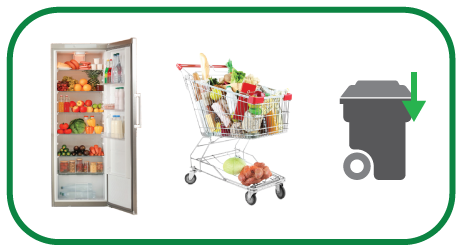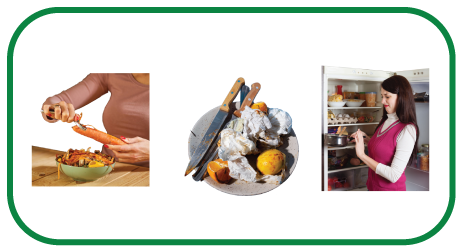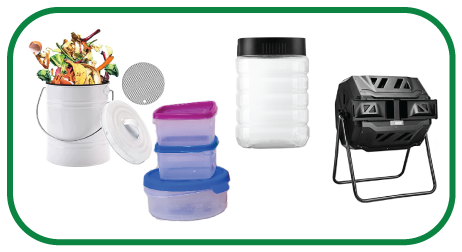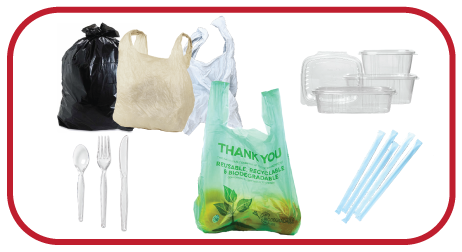Californians are required by law (S.B. 1383) to separate organic waste out of their trash and add that waste to their previously named green waste cart. This law targets removing food waste, and organic material as a whole, from landfills. Organic material in landfills are attributed for generating 20% of the State’s methane according to the CalRecycle, the State’s solid waste governing agency. Additionally, CalRecycle has found that organic waste makes up half of all waste that is dumped in landfills.

Residential Organic Waste
For Residents of Galt, Woodbridge and Rancho Murieta.

Some organic waste processors in the region may not accept compostable plastics, and for that reason, Cal-Waste reserves the right to not accept any compostable plastics (plastic bags, utensils, etc.) in organic waste carts and other receptacles.
What is organic waste?
Organic waste includes any and all food, food scraps and food byproducts, yard and landscape waste, lumber (untreated or painted), and paper products (that are not recyclable).
What goes in the organic waste cart?
Place food scraps, food-soiled paper yard trimmings and acceptable garden waste in the organic waste cart.
What will happen to diverted (recycled) organic waste?
Organic waste will mostly be turned into compost or used in anaerobic digestion to create renewable energy.
How often will my organics cart get picked up?
Organics carts will be serviced weekly alongside trash carts.
If something is biodegradable, does that mean it can go in the organics cart?
No. Many food packaging companies label their bio-based cups or eating utensils as “biodegradable,” but in reality they are neither compostable nor recyclable. These products are blends of bio-based resins and petro resins and, sadly, go to landfill.
Can plastic bags go in the organics cart?
Plastic bags are not accepted in organics carts because plastic does not decompose and is considered to be trash. Compostable and biodegradable bags also do not consistently break down, are difficult to sift out, and result in contamination that decreases the quality of compost. The finished compost should be free of contamination and of good quality for use on soils.
We discourage the use of plastic liners to avoid additional waste. If you use plastic liners, please make sure to empty the contents into the green bin and throw the plastic liner in the trash bin.
Where do meat, poultry, and dairy products go?
All of these waste products may go in the organics cart.
To keep your green bin clean try:
- Wrapping your food scraps in paper napkins, paper towels, newspaper or a paper bag.
- Placing food in the freezer or refrigerator and taking it to the organic waste bin before scheduled pickup. Frozen food scraps slow down the decomposition process and can help prevent odors and pests.
- Keeping your green bin lids closed and out of direct sunlight, if possible.
What is food rescue?
For commercial food service businesses, surplus edible food must be donated to food recovery organizations instead of thrown away. This will help feed the almost 1 in 4 Californians who are food insecure.
Cal-Waste has researched some potential benefits of organic waste recycling experienced by residents in other “early-adopter” communities (outside of Cal-Waste’s service area). How you handle food waste in your kitchen is up to you. There are many different options for collecting and disposing of food waste in your Organic Waste cart, so test different methods and see what works best for your lifestyle!
- Compliance with state and local laws
- Maintaining a clean refrigerator and freezer
- Monitoring and lowering grocery bills
- Potentially downsizing your trash cart

- Preparing meals
- Cleaning up after meals
- Cleaning out the refrigerator, freezer or pantry

- Old plastic containers or empty food containers
- Home composting systems
- Kitchen pales: countless options available through amazon or a local hardware store

- Plastic bags are not allowed in organics carts. If you choose to use a plastic bag to collect food waste in the kitchen the bag must be emptied and thrown away in the trash cart.
- Plastics marketed as “bio-degradable”, “compostable”, or “eco-friendly” are not allowed in organics carts.

California passed Senate Bill 1383 in 2016 that set reduction targets for methane emissions in a statewide effort to reduce emissions of short-lived climate pollutants (SLCP). The targets must:
- Reduce organic waste disposal 50% by 2020 and 75% by 2025.
- Rescue for people to eat at least 20% of currently disposed surplus food by 2025.
The state has assessed that landfills are the third largest source of methane. According to CalRecycle, the state’s enforcement agency for solid waste, 20% of the state’s methane emissions come from landfills. Organic materials like food scraps, yard trimmings, paper, and cardboard make up half of what Californians dump in landfills.
Senate Bill 1383 states that starting in 2022, all jurisdictions need to provide organic waste collection services to all businesses.
Visit CalRecycle’s Website For Legislative Information
Local Government Requirements and Resources

